Best Online Basketball Betting Sites 2024
Brush up on your knowledge of the game and make sure you’re making the best bet. Read on for our full guide to the best online basketball betting sites.
With its massive global following, action-packed games, and quick-fire scoring, basketball is hugely popular at online sportsbooks. Our team has worked to provide you with the best online basketball betting experiences, giving you an excellent all-round betting experience online. Start betting below or jump to:
- Our top 10 basketball betting tips
- The most popular betting markets in basketball
- Basketball betting FAQs
The Top Online Basketball Betting Sites
| Rank | Casino | Bonus Offer | Payout Speed | Win Rate | Play Online | ||
|---|---|---|---|---|---|---|---|
| #1 Top Rated Sportsbook |
0
Bonus T&Cs Apply Must be 21+ and present in select states. First online real money wager only. $10 first deposit required. Bonus issued as nonwithdrawable bonus bets that expire 7 days after receipt. See terms at sportsbook.fanduel.com. FanDuel is offering online sports wagering in Kansas under an agreement with Kansas Star Casino, LLC. Gambling Problem? Call 1-800-GAMBLER or visit FanDuel.com/RG (CO, IA, KY, MI, NJ, OH, PA, IL, TN, VA, VT), 1-800-NEXT-STEP or text NEXTSTEP to 53342 (AZ), 1-888-789-7777 or visit ccpg.org/chat (CT), 1-800-9-WITH-IT (IN), 1-800-522-4700 or visit ksgamblinghelp.com (KS), 1-877-770-STOP (LA), visit www.mdgamblinghelp.org (MD), 1-800-522-4700 (WY), or visit www.1800gambler.net (WV). Full Terms Apply | 286 claimed this offer in the last month | Payout 1-2 days | Win Rate N/A | |||
| 2 |
0
Bonus | 198 claimed this offer in the last month | Payout 1-2 days | Win Rate N/A | |||
| 3 |
0
Bonus | 154 claimed this offer in the last month | Payout 1-2 days | Win Rate N/A | |||
| 4 |
0
Bonus | Payout 1-2 days | Win Rate N/A | ||||
| 5 |
0
Bonus | Payout 2-5 days | Win Rate N/A | ||||
| 6 |
0
Bonus | Payout 1-2 days | Win Rate N/A | ||||
| 7 |
0
Bonus | Payout 2-7 days | Win Rate N/A | ||||
| 8 |
0
Bonus | Payout 1-3 days | Win Rate N/A |
What is Online Basketball Betting?
Online basketball betting is very similar to placing a bet with a real-life bookmaker. You simply choose your market, consider the odds available and select the amount you want to bet. Basketball betting has become increasingly popular in recent years, in part due to the straightforward scoring and the fact that there are plenty of breaks in play that allow you time to make a wager.
How to bet on basketball games online
Placing a wager online at your chosen sportsbook is very simple. When you want to bet on basketball, follow these steps:
- 1Choose the site you want to use, then register by filling in your details.
- 2You will need a username and password, and possibly a security question and answer for extra protection.
- 3Use your promotional code (most sportsbooks offer one to new bettors) to generate a bonus.
- 4Accept the site’s terms and conditions.
- 5Take some time to learn how to navigate around the site or app so that you know how to find the betting opportunities you want.
- 6Choose basketball from the list of sports, select your league, bet and markets and start betting.
The Biggest Basketball leagues
- NBA
- NCAA
- EuroLeague
- NBL
NBA (National Basketball Association)
The NBA is the pinnacle of basketball, the big North American league with the big players and the big bucks. Millions of fans across the world follow the fortunes of NBA teams, with games broadcast in over 40 different regions. Star players such as Michael Jordan, LeBron James and the late Kobe Bryant have enjoyed a level of fame that transcends the sport. You can visit our dedicated online NBA betting page here.
Did you know: More than $500million is staked every month on NBA games in the state of Nevada alone.
- 30 Number of teams
- 82 Games played per season
- Los Angeles Lakers 2020 champion
- Boston Celtics Most titles won (17)
Tournaments associated with the NBA:
NBA finals
Played in best-of-seven format between the champions of the Eastern and Western Conferences.
Play-offs
The top eight teams in each of the two conferences goes forward to the post-season play-offs.
Eastern/Western Conferences
Each conference has three divisions apiece and teams play a regular season between October and April.
All-Star Weekend
A three-day event in February featuring a game where the best players in the Western Conference face those from the Eastern.
Top 10 basketball betting tips
If you want to place winning bets, it’s important to have a solid understanding of the game and knowledge of the teams and players. There are many different factors that can also influence the outcome of a basketball game or tournament. To get you started, here are our four top tips for placing a basketball bet.
1. Follow the “four factors”
Basketball experts believe that careful study of four factors – shooting, turnovers, rebounds and free throws – can enable you to construct a reliable betting model. This involves some time and application, but it will also help you to predict the point spread of games and bet accordingly.
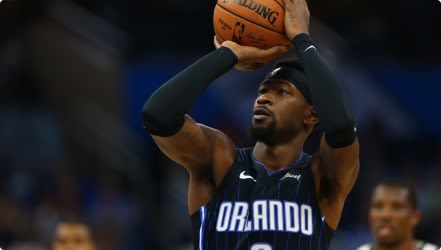
2. Check the schedule
Look out for teams who are slated to play back-to-back games. If the team is in good form, their momentum could make them a good bet to win their next game. If they are on a losing streak, the quick turnaround could mean they are going to struggle again.
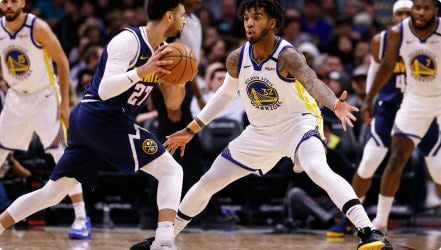
3. Don’t dismiss slower games
When it comes to total points bets, most basketball fans want to see exciting, high-scoring matches and are likely to wager accordingly. That means the notional points total set by the sportsbook could be too high. If you foresee a closely-fought, low-scoring game, there will be some value in going under.
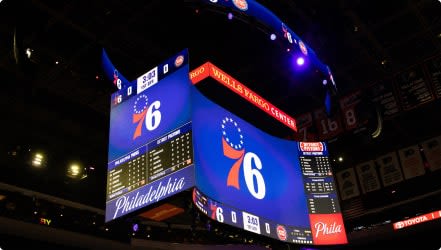
4. Know your distances
If a team have to travel a long way for a match – especially with NBA matches if they have played very recently on the other side of the United States - fatigue may be a factor. Even if teams fly first-class, the physical strain of travelling such a long way may count against them when they take to the court.

5. Look out for injuries
Injuries are key to keep track of. If a team doesn’t have their star players, then that could alter your predicted outcome. It’s also good to keep an eye on resting players. Some players will be ruled out well in advance, but other will be left as a ‘game-time decision’.
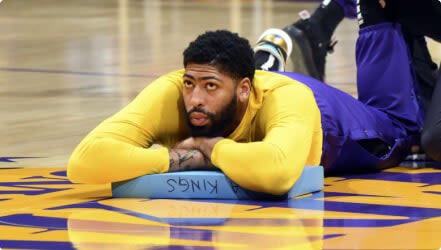
6. Watch for big line moves
Public participation can often sway betting lines. If one team has a lot of hype and press around them, then the public might bet more in the team’s favor. A betting site’s odds will quickly adjust to reflect this, potentially creating value for the underdog. Perfect timing to jump on moving lines has been known to help maximize profits!
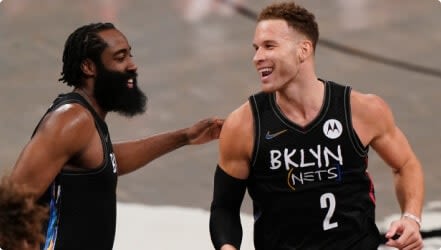
7. Know referee tendencies
The official enforces the rules of a basketball game. Though they shouldn’t influence the outcome of your wager, sometimes it can help to understand their style. Certain officials call lots of fouls while others are more inclined to let the team play. Knowing the referee’s tendencies can help shape your decision.
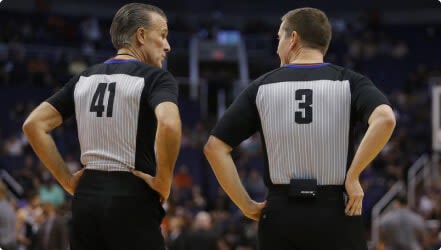
8. Shop around for the best odds
Shopping for lines is the process of checking multiple sportsbooks for the best odds. The better the odds, the bigger the overall profit will be. It’s a simple tip but one that can really maximize your payout. The easiest way to do this is to simply hold an account with multiple sports betting sites.
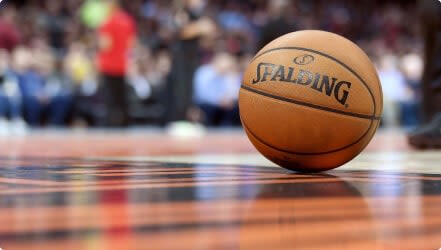
9. Don’t bet with your heart
Everybody has their favorite team. When it comes to basketball betting, be sure to bet with your head and not your heart. Look past emotions and try to make an informed betting decision based solely on research.
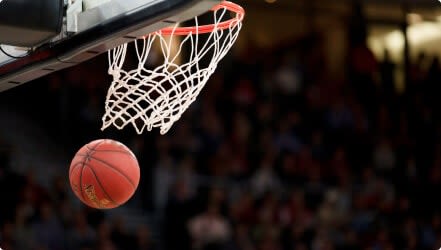
10. Know your numbers
It goes without saying, the most important rule of basketball betting is managing your bankroll. The NBA is a long season, so it’s not wise to try and bet on every single game. Budget how much you want to spend and highlight the key games you’re interested in.
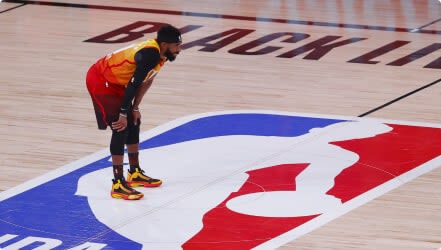
Betting markets in basketball
Basketball offers a wide range of betting options. Before placing a bet online, it’s a good idea to get a proper understanding of how they work. Take a look through some of the most popular bet types and markets below. If you’d like to know more about different odds formats, take a look at our sports betting odds page first.
- Moneyline
- Total points
- Handicap
- Outright winner
- Quarter-based betting
- Half-based betting
- Overtime – yes/no
- Both teams to score x points
- Player to score x points
Moneyline
This is an eternally popular choice of bet because it is the simplest. All you do is select the side you think is going to win.
In the US, moneyline odds are displayed as follows:
- The favourite has a number preceded by a minus. So, if the Chicago Bulls are -160, you have to stake $160 to win $100.
- The underdog’s number is preceded by a plus; if the Toronto Raptors are +140, you stake $100 to win a profit of $140.
In countries where decimal or fractional odds are preferred, instead of -160, you might see the odds displayed as 1.63 or 63/100, and instead of +140, you might see 2.40 or 7/5. This type of bet may also be referred to as a straight bet.
The good news is that pretty much every sportsbook – and certainly the ones listed on this page – will offer mobile betting via its website or a dedicated app. With mobile betting, you can wager on basketball wherever you are and whatever device or mobile phone you use.
How we rate betting sites
Basketball betting is available at every major sportsbook. If you want to begin online basketball betting at a new site, it can be confusing when you are trying to select which sportsbook to use. Our expert team apply several factors to help you decide which are the best options in online sports betting.
Promotions
Betting is an extremely competitive market. One way in which sportsbooks attract new customers is with tempting promotions. This is often in the form of a free bet or bonus for signing up. We analyse betting sites to see which offer the best incentives for you to join them.

Security and customer support
It’s essential that you feel completely certain that, when you hand over your money to a betting site, your financial details are safe. We check the level of security on offer and we also check for legitimate licensing and certification on sites offering SSL encryption. We also like to see speedy and helpful customer support available to users.

Payment options
We believe betting sites should offer a variety of payment options and give extra credit to those that offer a good level of flexibility and pay out winnings quickly. We also look at the payout percentages and mark up those who are more generous in the amounts they return to bettors.

Range of bets
People like to bet in all sorts of ways on basketball. The nature of the sport lends itself to a wide variety of wagers. Accordingly, we look for sportsbooks that are able to handle the tastes of different bettors by offering as broad a range of betting opportunities and different markets as possible.

Mobile betting
Mobile betting is now preferred by many sports betting fans, especially while on the go. It is, therefore, absolutely critical that sportsbooks have a mobile offering, or their own dedicated app, to make placing a wager as straightforward a process as possible.

Best basketball betting sites
| Rank | Sportsbook | Bonus Offer | Payout Speed | Bet Online |
|---|---|---|---|---|
#1
| Fan Duel | Bet $5, Get $150 in Bonus Bets if Your Team Wins | 1-2 days | |
#2
| Caesars | $1,000 First Bet on Caesars | 1-2 days | |
#3
| BetMGM | Bet $5, Get $150 in Bonus Bets! | 1-2 days | |
#4
| BetRivers | 2nd Chance Bonus Bet up to $100 | 1-2 days | |
#5
| Tipico | Deposit $50, Get $200 | 2-5 days | |
#6
| Bet365 | Bet $5 and Get $150 in Bonus Bets | 1-2 days | |
#7
| Betfred | $105 On Fred if your first bet loses | 2-7 days | |
#8
| Draft Kings | Get A No Sweat First Bet Up To $1,000 | 1-3 days |
Basketball Betting FAQs
Can you bet on women’s basketball?
Yes. Women’s basketball has been growing as a sport for many years and is popular and well respected. Competitions like the women’s college basketball attract good audiences, particularly in the US, and provide plenty of betting action at online sportsbooks.
How do odds work in basketball?
Odds in basketball work exactly the same as in any other sport. The odds in question are a mathematical expression of the likelihood of a particular outcome occurring. Your winnings are calculated by multiplying your stake by those odds.
How do you make money betting on basketball?
Before placing any bet, you want to be sure that you have as much up-to-date information about the game, team, tournament as possible. We recommend that you see the money you stake as an extra dimension to your enjoyment of a leisure experience. It’s great to win money – and with a lot of study and patience, it’s possible. But we suggest you simply enjoy the ride.
Where can you bet on basketball?
It’s safe to expect that virtually every sportsbook in the world now offers markets on basketball. The sport has grown hugely in global popularity in recent decades, driven by the commercial success of the NBA. You’ll find our selection of the best basketball betting sites right here on this page.
What is a double result in basketball?
This is a bet that asks you to predict the result of both halves of a game. So, if you think the Chicago Bulls will be winning after the first half but the Golden State Warriors will be winning at full-time, that’s your bet.
What is a moneyline bet in basketball?
Moneyline bets are wagers on who will win the game. For basketball, you can choose to either back the favorites or the underdogs. The favorites will be represented by a negative number (e.g -125), and the underdogs will be represented by a positive number (e.g. +125).
How do you bet on the spread in basketball?
To bet on the spread for basketball, start by heading to an online sportsbook. There you’ll find a point spread for each basketball game showing. The spread will show the favorites and the underdogs as well as the margin by which they need to win or lose by.
How to bet on the NBA?
To bet on NBA, head to a sportsbook and locate the basketball section. Don’t forget to check out our shortlist of the best NBA betting sites.
The brands/team logos featured on this page are for illustration purposes only and there is no association between any of these brands and casino.org.
